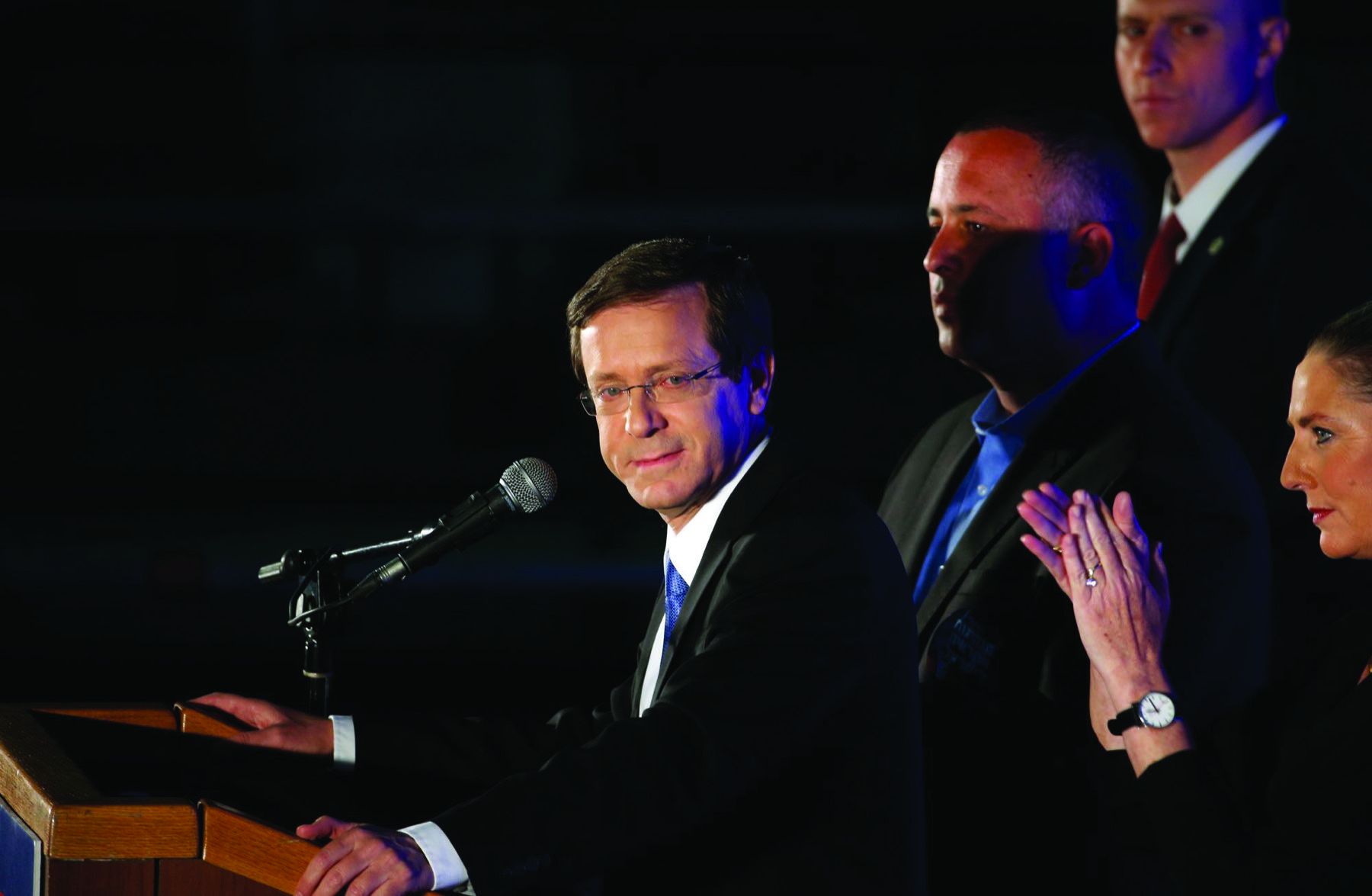 Isaac Herzog
Isaac Herzog The Israel-Diaspora “crisis” debate was thrust back into the headlines recently as word surfaced that Israeli opposition leader Isaac Herzog was chosen as the new head of the Jewish Agency, despite the protestations of Prime Minister Benjamin Netanyahu. The development was widely construed as a shot across the prime minister’s bow, a not-so-gentle reminder of the importance of the American Jewish community, whose positions, such as those on egalitarian prayer at the Western Wall, cannot be disregarded without consequence.
The Jewish Agency, which acted as a quasi-government in Mandatory Palestine, has since 1948 primarily been responsible for promoting and facilitating Jewish immigration to Israel. Increasingly, however, it has become a bridge between the Jewish community in the United States and the Israeli government, as concerns mount over the “distancing” of American Jews from the Jewish state.
While the matter has been covered extensively, there has been little detailed analysis as to whether the supposed trend can be reversed. In fact, whoever helms the Jewish Agency may be facing an irreconcilable paradox: As overall American support for Israel hovers at an all-time high, U.S. Jews are growing evermore indifferent, if not unsympathetic, toward Jerusalem.
Anecdotal evidence was offered in the form of a recent interview given by President Donald Trump, in which he contended that evangelical Christians were more appreciative than American Jews of the administration’s relocation in May of the U.S. embassy to Jerusalem.
That a statement of fact could evoke such insecurity among the American Jewish community suggests a growing uneasiness about its collective — and, in particular, its institutional — relationship to Israel.
“You know who really likes it the most is the evangelicals,” Trump asserted to interviewer Mike Huckabee, a former governor of Arkansas and presidential candidate. “I’ll tell you what, I get more calls of ‘thank you’ from evangelicals, and I see it in the audiences and everything else, than I do from Jewish people. And the Jewish people appreciate it, but the evangelicals appreciate it more than the Jews, which is incredible.”
It is well known that American Jews vote Democratic by about a 3-1 margin and, as such, it is unsurprising that a recent survey by the American Jewish Committee (AJC) found that 71 percent of American Jews disapprove of Trump, while only 26 percent maintain a positive opinion of him. By contrast, about 80 percent of evangelical Christians support the U.S. leader. There is no denying that the American embassy would still be located in Tel Aviv if not for this backing.
It may be that the bridges that unite Israel and the Diaspora are becoming shorter relative to the gaps that separate them.
What is startling, however, is how American Jews relate to Israel, as evidenced by the fact that when asked whether they view Israelis as part of their family (as a metaphor), nearly one-third of AJC survey respondents replied, “No.” Only 12 percent considered Israelis as their “siblings.”
Notably, a full three-quarters of American Jews have no family in Israel to whom they feel close.
Overall, a full 57 percent of American Jews disapprove of Trump’s handling of U.S.-Israel relations (with 41 percent disapproving strongly), the AJC poll found, with only one-third approving. At the other end of the spectrum, more than two-thirds of Israeli Jews support the U.S. president’s management of bilateral ties, according to a Gallup poll conducted before the White House recognized Jerusalem as Israel’s capital. The AJC survey pegged this number at over 75 percent.
According to a CBS News poll conducted in May, 41 percent of all Americans approve of Trump’s diplomatic approach to Israel, while 43 percent disapprove. Thus, a disproportionate amount of American Jews oppose Trump’s policies vis-a-vis the Jewish state.
In regard to moving the U.S. Embassy from Tel Aviv to Jerusalem, just 46 percent of American Jews expressed support for the relocation, whereas 47 percent opposed it, the AJC found; this, compared to an overwhelming 85 percent of Israeli Jews who supported the move. A survey by the University of Maryland found that almost 75 percent of Jewish Israelis supported moving the embassy, including the timing of the decision (which suggests a willingness to decouple the initiative from the peace process with the Palestinians). A similar poll conducted by the Israel Democracy Institute found that close to 70 percent of Israeli Jews believe the move advanced the country’s interests.
Indeed, virtually the entire Israeli political echelon was in favor of the enterprise, with the exception of the Arab parties and the far-left Meretz (whose new leader was criticized for her position, which some believe was assumed simply to make waves).
While much has been written about the growing Israel-Diaspora divide, the focus of the conversation is generally limited to the context of internal Israeli politics; that is, Jerusalem’s inability to end the conflict with the Palestinians and the government’s ongoing acquiescence to ultra-Orthodox Charedi parties, which have used their influence (read: manipulated a defective electoral system) to thwart attempts to integrate their constituents into society while — of greater concern to American Jews — preventing the Conservative and Reform denominations from gaining equal footing in Israel.
However, Israelis themselves are divided almost down the middle on the Palestinian issue, whereas a huge portion of the population loathes the Charedi ability to effectively hold the government hostage to untenable demands.
Yet, there is no discussion of Israeli Jews distancing themselves from Israel.
It makes sense that American Jews would, not unlike their Israeli counterparts, harbor opposing opinions on these matters, which at times might descend into overt derision, as was the case when Netanyahu backtracked on a compromise that would have created a second egalitarian prayer section at the Western Wall.
What does not make sense is the propensity of American Jews to conflate in all instances the Israeli people with the government they elected. In the case of the “Kotel compromise,” almost 60 percent of Israelis supported the creation of the proposed prayer section; however, this did not deter American Jewish leaders from threatening to punish “Israel” because of the decision of one man.
This is tantamount to opposing, or even rejecting, America because one does not like Trump’s immigration policy. While an individual is entitled to this right, it is nonetheless an immature reaction — the “default” response in an increasingly polarized world — given that the United States always has been and always will be so much more than one policy and the singular person who occupies the Oval Office.
In order to delve further into the matter, then, requires homing in on a particular issue in which a major consensus among the Israeli people creates a major incongruence with American Jewry. And the American embassy relocation is a perfect example because it isolates the U.S. Jewry “variable” as the Israeli “coefficient” is a near-constant.
In this respect, American Jews identified more closely with Arab Israelis and the fringes of the Israeli left, neither of which maintain much support from Israel’s Jews. Why not postulate, then, that the growing “crisis” between Israel and the Diaspora is a byproduct of the latter’s apparent dramatic shift leftward as opposed to the former’s swing to the right (which, mind you, has been well-documented)?
And even so, what justification is there for American Jews to “distance” themselves from an allied, if not brotherly, country whose majority promotes a different value system that is nevertheless rooted in similar principles?
It is an interesting and inadequately tested hypothesis, especially given that shared values would account for why the positions of Republican-leaning evangelicals and Israelis on Trump, in general, and his recognition of Jerusalem of Israel’s capital, specifically, coincide — whereas those of left-leaning Democrats, the party of most American Jews, do not. To this end, the AJC found that over 50 percent of U.S. Jews identify to some degree as “liberal.”
Indeed, there are other indications that diverging values, which manifest in an individual’s “worldview,” may, in fact, be a — if not the — root cause for the growing Israel-Diaspora divide. Most troubling, perhaps, is the AJC finding that a full 20 percent of American Jews believe that Israel should be redefined only as a democracy, effectively ridding the country of its “Jewishness.”
Israeli Jews, for the most part, are liable to associate such a position with that of exterminationist enemies.
It may be that the bridges that unite the two sides are becoming shorter relative to the gaps that separate them; this, as both populations continue to evolve ideologically under very different circumstances and in what appears to be opposite directions. If so, it is unfair to blame one party without fully investigating the changing principles and practices of the other. Any one-sided approach cannot encapsulate the intricacies of a complex dynamic; to the contrary, it may exaggerate dissimilarities or create a mirage of their existence even when there are none.
Thankfully, there is still time for the likes of Herzog to work through the matter, given that the AJC found that 80 percent of American Jews still believe a thriving State of Israel is vital for the long-term future of the Jewish people, of whom three-quarters still consider themselves members. Moreover, a full 70 percent of respondents answered in the affirmative when asked whether “caring about Israel is a very important part of my being a Jew.”





















 More news and opinions than at a Shabbat dinner, right in your inbox.
More news and opinions than at a Shabbat dinner, right in your inbox.